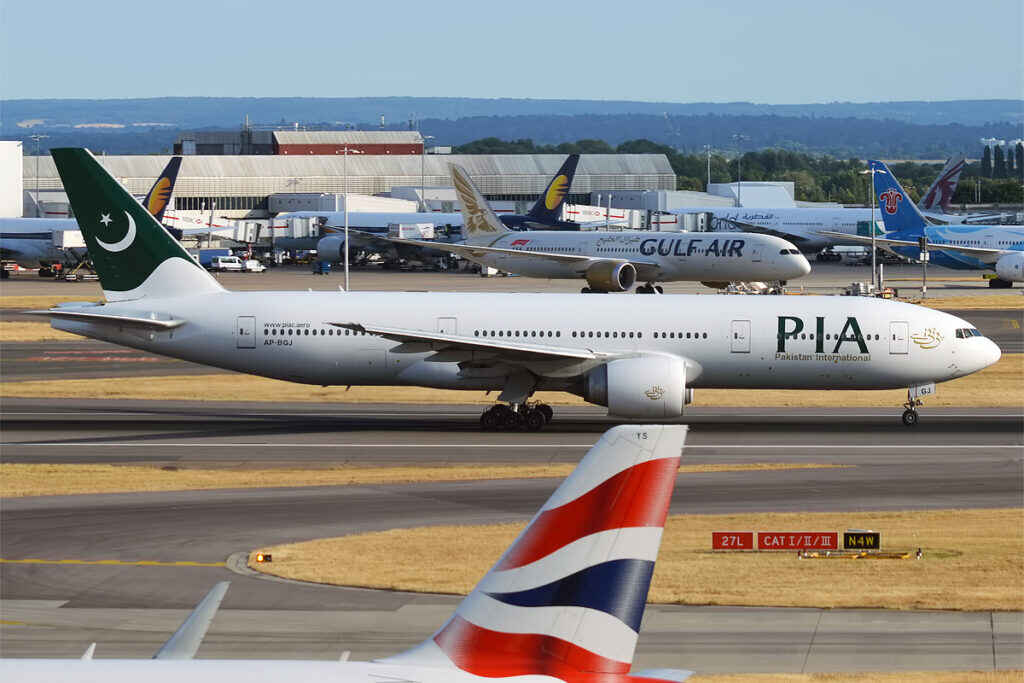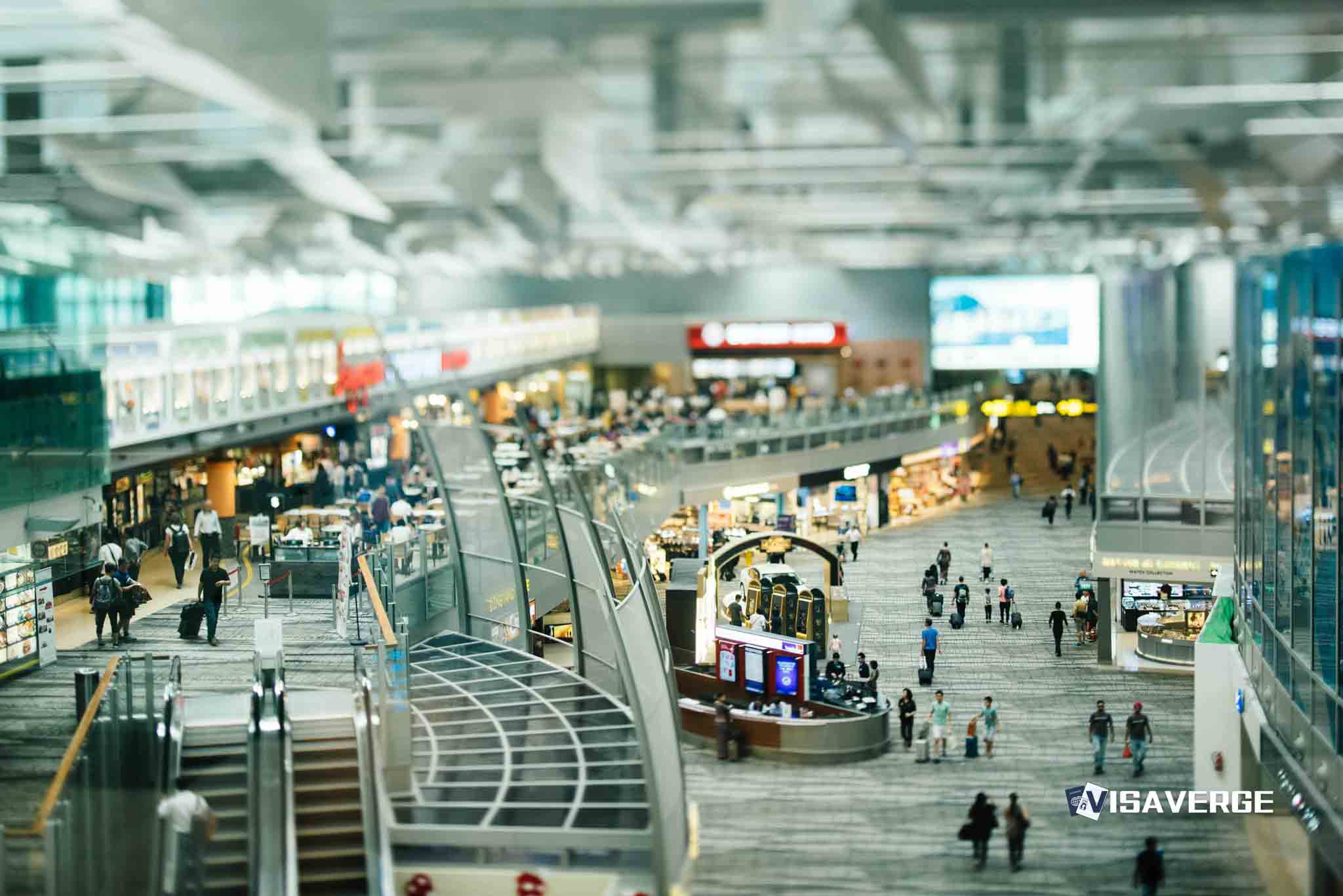(KARACHI, PAKISTAN) Pakistan International Airlines cancelled and delayed dozens of flights across the country beginning November 3, 2025, after aircraft engineers refused to issue safety clearances over pay and working conditions, snarling travel plans and leaving hundreds of passengers — including Umrah pilgrims — stranded at major airports in Karachi, Lahore, Islamabad and Rawalpindi. The disruption continued into midweek as the airline scrambled to bring in outside engineering support and management moved to discipline staff resisting orders to release planes they say are not airworthy.
PIA officials said at least 55 flights were affected on Monday, with five cancelled across Karachi, Lahore and Islamabad. A separate tally from the airline listed seven cancellations and 39 delays nationwide the same day, underscoring the scale of flight disruptions that rippled through domestic and international routes. Twelve international services were hit, including those to Muscat, Jeddah, Dammam and Dubai, pushing families to sleep in terminals or hunt for alternate tickets as the standoff hardened and schedules slipped further behind.

Engineers said they were not on strike but would not sign off aircraft they consider unsafe, framing the action as a safety stand, not an industrial stoppage.
“Anything they don’t consider airworthy won’t get clearance,” Society of Aircraft Engineers of Pakistan (SAEP) sources said.
They described months of pressure to release planes without sufficient spare parts and years without a raise, and said they have been wearing black armbands for more than two months to press their case.
“Even during this long, peaceful protest, the airline’s management didn’t bother to sit down and talk to them,” SAEP sources said, adding that the refusal to sign safety clearances is a last resort in the absence of negotiations.
“We could not put passengers’ lives at risk because of pressure from the airline’s management,” the SAEP sources said.
PIA management has rejected the engineers’ characterization and cast the pushback as a coordinated effort to thwart the government’s plan to privatise the national carrier. PIA spokesperson Abdullah Hafeez Khan said,
“The main objective of this movement is to sabotage the ongoing process of PIA’s privatisation, which is now in its final stages.”
He further argued the association lacks legal recognition, adding, “The SEAP has no legal standing. Using safety as an excuse to collectively stop work is a planned attempt to derail PIA’s privatisation.” The airline warned that Pakistan’s Essential Services (Maintenance) Act, 1952, is currently in force, making strikes or work stoppages illegal within essential sectors.
“All individuals involved in such conspiratorial activities, or those supporting them, will face legal action,” the spokesperson warned.
Amid the stalemate, PIA said it brought in engineers from a private company, though they were able to clear only two flights. The airline is also seeking engineering support from other carriers to ease the backlog as it tries to restore normal operations. According to officials, some delayed flights have now departed, and they described a gradual, if uneven, restart. But with engineers still refusing to sign technical clearances for aircraft they deem unfit, cancellations and long delays persisted through November 5, 2025, complicating travel for passengers already queued up by earlier bottlenecks.
The immediate impact was stark at major hubs. Karachi–Skardu services were cancelled along with Lahore–Karachi flights, a setback for domestic travelers at the start of a working week. On trunk routes, Karachi–Lahore flight PK-302 was delayed by more than 14 hours, while Karachi–Islamabad’s PK-300 did not take off as scheduled, leaving passengers to wait out the uncertainty in terminals or disperse to rebook. In the north, the mountainous Islamabad–Gilgit flights PK-601 and PK-602 failed to operate, severing a key link for communities reliant on limited air services.
International routes fared little better. Lahore–Muscat flights PK-329 and PK-330 were cancelled, stranding travelers bound for Oman. Islamabad–Dubai flight PK-233 was delayed by nine hours, pushing arrivals into the night and triggering missed onward connections. Additional long-haul delays included Peshawar–Doha flight PK-218 and its return leg PK-286, each delayed by 18 hours. Pilgrimage routes and Persian Gulf services also buckled under the strain: Islamabad–Dammam PK-245 was delayed seven hours, Islamabad–Jeddah PK-761 by 12 hours, and Lahore–Madinah PK-747 by 14 hours, leaving Umrah pilgrims and workers facing uncertainty over visas, accommodations and connecting travel.
The engineers’ demands grew out of grievances they say have built up for years. SAEP sources said engineers have not received a pay raise in eight years despite a workload they describe as stretched by a shortage of spare parts and aging equipment. They alleged management has repeatedly pressured them to approve flights in breach of aviation rules, a claim PIA rejects. The engineers’ union signaled that while they are not staging a formal walkout, they will not certify planes that do not meet safety thresholds. The insistence on safety clearances sits at the core of the dispute: without signatures from licensed engineers, aircraft cannot legally depart.
PIA management has responded with a mix of administrative penalties and legal warnings. The airline transferred six engineers from Peshawar to Karachi and indicated more moves could follow, a step meant to shore up capacity at the largest base while signaling consequences for those seen as obstructing operations. The chief executive escalated the tone further, warning staff who impede flights would be held accountable.
“Any engineer responsible for disrupting operations would face tough measures,” the CEO warned,
with officials citing the Essential Services law to justify disciplinary and legal action. The airline has also tried to blunt the engineers’ leverage by bringing in outside personnel; however, the early results — just two flights cleared by private-company engineers — underlined how dependent operations are on in-house certifications.
The political stakes are high. The confrontation is unfolding as the government moves to privatise PIA, a step tied to Pakistan’s $7 billion bailout from the International Monetary Fund. Four companies — Arif Habib Limited, Fauji Fertiliser Company, Air Blue and Lucky Group — are participating in the process. Management asserts the timing of the engineers’ action is no coincidence, arguing it is designed to spook bidders and stall a sale process it says is in its final stretch. The engineers’ camp counters that the issue is not politics but safety and long-running neglect of technical needs.
For passengers, the reasons mattered less than the immediate fallout. Families camped in departure halls and sprawled across benches as schedules shifted hour by hour. Ground staff grappled with crowds at service desks while pilots and cabin crew waited for aircraft to be released from the engineering line. With Pakistan International Airlines controlling key domestic and pilgrimage routes, alternatives were limited. Even where private airlines operate, seats filled quickly, prices rose, and rebooking fees piled up for those trying to salvage travel plans on short notice.
Across the network, disruption touched nearly every corner of PIA’s schedule. In addition to Karachi–Lahore PK-302’s 14-hour delay, PK-304 on the same corridor slipped by 10 hours and PK-306 was cancelled outright. Islamabad’s departure boards showed snarled flows to the Gulf: PK-233 to Dubai left nine hours late; PK-245 to Dammam and PK-761 to Jeddah both pushed deep into the day; and the northern feeder flights PK-601 and PK-602 to Gilgit were scrubbed entirely. In Peshawar, the 18-hour hold on PK-218 to Doha and corresponding delay on PK-286 returning from Doha signaled that long-haul operations were no better insulated from the engineering logjam than short domestic hops.
PIA officials said they secured limited external help to restart some departures, but the patchwork fixes were not enough to normalize the roster. The airline’s attempt to tap other carriers for engineering assistance is an acknowledgment of the specialized work required to return aircraft to service safely and legally. Safety clearances involve rigorous inspections and documentation checks on critical systems, and Pakistan’s regulators and airlines have long stressed compliance with maintenance protocols overseen by bodies such as the Pakistan Civil Aviation Authority. Without signoff, aircraft sit idle at gates or in hangars, ratcheting up delays as crew duty hours expire and slots at congested airports are missed.
Tensions deepened as both sides framed the conflict in stark terms. Engineers said they were being asked to compromise on standards despite a scarcity of spare parts, a situation they claim has been escalating for months as they wore black armbands to call attention to safety and pay issues. Management insisted the movement is an orchestrated attempt to derail privatisation, with Abdullah Hafeez Khan contending not only that the timing is targeted but that SAEP is not recognized.
“The SEAP has no legal standing. Using safety as an excuse to collectively stop work is a planned attempt to derail PIA’s privatisation,” he said, adding that the airline would seek remedies under laws that prohibit work stoppages in essential services.
The legal backdrop is central to management’s strategy. The Pakistan Essential Services (Maintenance) Act, 1952, which covers vital public services including national transportation, bans strikes and other forms of collective work stoppage that can disrupt essential operations. PIA’s spokesperson said the law is in force and that organizers and supporters of the slowdown could face penalties.
“All individuals involved in such conspiratorial activities, or those supporting them, will face legal action,” he warned,
a statement intended both for the engineers refusing safety clearances and any staff perceived to be aiding the protest.
By midweek, the airline’s messaging shifted toward cautious optimism, with officials saying operations were gradually being restored as alternative engineering support came online and some delayed aircraft finally took off. That recovery remained fragile. Each unresolved maintenance signoff meant another aircraft held back, another crew assignment thrown off, and another set of passengers in limbo. On high-demand routes — from Karachi to Lahore and Islamabad, and out to Gulf hubs like Dubai, Muscat and Dammam — small gains were often offset by fresh hold-ups elsewhere in the system.
The dispute also exposed the delicate balance between operational pressures and regulatory compliance in an airline facing financial strains and political scrutiny. For engineers, the refusal to sign safety clearances is both a professional line and an instrument of leverage after eight years without a raise and months of unanswered protests. For PIA, the timing collides with an attempt to convince investors and lenders that the carrier can run reliably under private ownership, with enough discipline to keep schedules and enough flexibility to manage shocks. Each delayed or cancelled flight is a reminder to potential buyers — Arif Habib Limited, Fauji Fertiliser Company, Air Blue, Lucky Group — that labor relations and technical governance will be as central to a turnaround as balance sheet fixes.
On the concourses, passengers weighed those larger stakes against immediate needs: whether to wait for a flight that may leave at midnight, rebook to a later date, or switch airlines entirely. Umrah groups traveling to Jeddah and Madinah felt the pinch acutely as visa windows and hotel bookings tightened with each hour and the cost of changing plans mounted. Workers bound for Dammam and Doha faced a similar squeeze on connecting itineraries and employer deadlines, with the nine-hour delay to PK-233 and 18-hour hold-ups on Doha flights cascading through their schedules.
As of November 5, 2025, the standoff showed no clear endpoint. Engineers held their ground on safety clearances, saying they would not be pressured into certifying aircraft without proper parts and procedures. Management doubled down on disciplinary measures, including transfers like the move of six engineers from Peshawar to Karachi, and warned of legal consequences under essential-services rules. The airline continued to lean on outside engineers and support from other carriers to chip away at the backlog, aiming to stabilize departures while negotiations — if any — remain out of public view.
Both sides claim to be acting in the public interest. Engineers say their refusal is about preventing an accident; the airline says it is protecting a privatisation process tied to the country’s financial commitments. Between those positions are the passengers who cannot choose whether safety, legal status or ownership structure matters most. They simply need flights to run on time. Until Pakistan International Airlines and its engineering teams resolve the impasse over pay, parts and procedures, the risk of fresh flight disruptions will remain, and the country’s aviation lifeline — from northern valleys to Gulf corridors — will continue to strain under the weight of grounded planes and frayed patience.
This Article in a Nutshell
From November 3, 2025, Pakistan International Airlines saw widespread disruption as engineers refused to sign safety clearances over pay and spare-part shortages. At least 55 flights were affected, including 12 international services; several flights were cancelled and many delayed, with long holds on routes to Muscat, Dubai, Doha, Jeddah and domestic trunk lines. PIA hired external engineers, transferred staff and warned of legal action under the Essential Services (Maintenance) Act, 1952. The dispute—framed by engineers as a safety stand and by management as sabotage of privatization tied to a $7 billion IMF program—continued into November 5, leaving passengers stranded and operations fragile.













